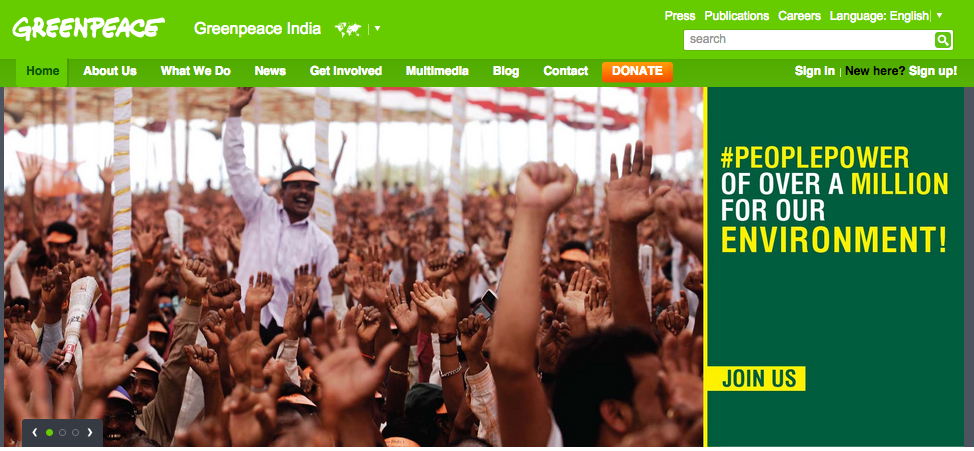The Indian government has stepped up its campaign against Greenpeace’s subcontinental arm by freezing the organisation’s bank accounts after a Delhi High Court twice fended off government attacks on the NGO.
The account Greenpeace India uses to store international funds has already been frozen once – purportedly because Greenpeace’s advocacy had “prejudicially affected the national interest” – but was restored by the courts earlier this year.
In January, Justice Rajiv Shakdher reversed the government’s “untenable” decision, because “there [was]no material whatsoever on record which would justify declining [Greenpeace’s] request for allowing it access to its bank account”.
“Non-Governmental Organisations often take positions which are contrary to the policies formulated by the Government of the day,” he noted. “That by itself, in my view, cannot be used to portray [Greenpeace’s] actions as being detrimental to national interest.”
Greenpeace said the government is trying to shut it down because it has been critical of its development agenda, which it argues is inequitable and damaging to the environment due to its reliance on coal and other polluting activities.
Human rights groups, as well as the courts, have met the government’s financial interventions with scepticism.
“It is clear that Greenpeace is being targeted because its strong views and campaigns question the government’s development policies,” G.Ananthapadmanabhan, the Executive Director at Amnesty International India, said.
One campaign in particular, which aims to shine a light on alleged human rights abuses connected with a mining development in Madya Pradesh province, has embarrassed the government.
The development – known as the Mahan Coal Block – would have destroyed 400,000 trees and the livelihoods of 50,000 people, Greenpeace said.
In a bid to draw attention to the issue a Greenpeace activist Priya Pillai was due to fly to London in January to meet with British MPs. When she got to the airport, though, she discovered she had been blacklisted and was not permitted to leave the country.
The government’s interference was slammed by Amnesty International India, which described the move as a further attempt “to disable an organisation for promoting the voices of some of the country’s most powerless people”.

Ms Pillai took the government to the Delhi High Court which, in January, found her fundamental rights had been infringed.
Criticism like Pillai’s may not be “palatable” to the government, Justice Shakdher ruled, but “it cannot be muzzled”.
“The State may not accept the views of the civil right activists, but that by itself, cannot be a good enough reason to do away with dissent,” he said in his judgement.
He ruled that the travel restrictions violated fundamental rights and noted that there was nothing on the record to suggest that Greenpeace’s activities “have the potentiality of degrading the economic interest of the country”.
Allowing the government to form a “subjective view” of activists as “anti-national”, Justice Shakdher said, “would result in conferring un-canalised and arbitrary power in the executive”.
Ironically, the government has since backed down on its Mahan Coal Block plans, and will only clear three of the 74 blocks it had originally intended to.
"Even as we celebrate this win for thousands of Indians, we are painfully aware that Mahan is just one of hundreds of coalmines planned in forested India,” Pillai said at the time.
Just under three weeks later, on Apirl 9, Greenpeace received a notice advising that both its domestic and international fund bank accounts would be frozen.
The notice alleges a range of tax infringements, unapproved relocation of its offices and, again, that Greenpeace International funds were used in a way prejudicial to the national interest.
The green group now has 30 days to respond, and will be forced back to the courts to have its funds unblocked.
“Instead of dubbing Greenpeace International India anti-national, the government should focus on the vital issues that it raises,” Ananthapadmanabhan said.
“Amnesty International India is particularly concerned about the rights of the Adivasis [indigenous Indians]affected by state policies, and urges the government to strengthen protections for these communities,” he said.
“The government is simply ignoring the concerns of the hundreds of thousands of Indians who support our campaigns, and the 70,000-plus Indians who support us financially,” said Samit Aich, the Executive Director of Greenpeace India.
“This isn't about Greenpeace India's constitutional and unquestionable right to receive funds from abroad, this is about the government trying to shut us down.”
Donate To New Matilda
New Matilda is a small, independent media outlet. We survive through reader contributions, and never losing a lawsuit. If you got something from this article, giving something back helps us to continue speaking truth to power. Every little bit counts.



